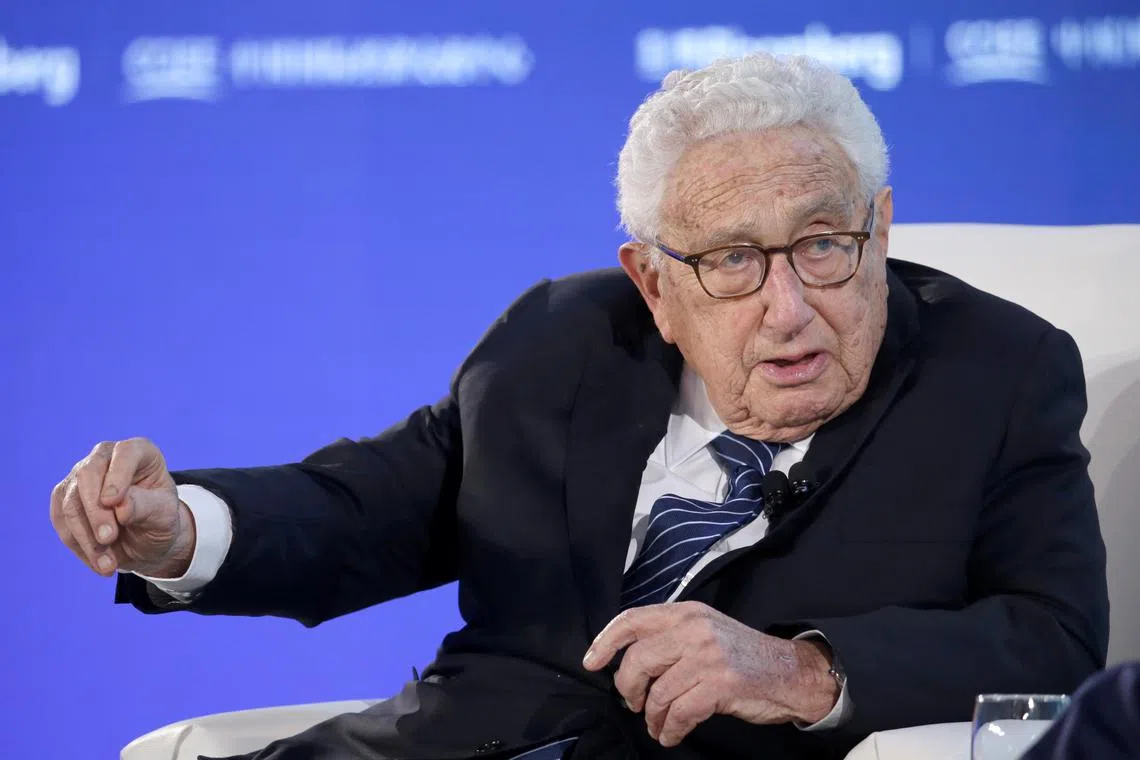Kyiv dismisses Henry Kissinger calls for negotiated peace in Ukraine
Sign up now: Get ST's newsletters delivered to your inbox

Dr Henry Kissinger warned that desires to render Russia “impotent”, or even seek the dissolution of Russia, could unleash chaos.
PHOTO: REUTERS
MOSCOW - Veteran US diplomat Henry Kissinger said the time is approaching for a negotiated peace in Ukraine to reduce the risk of another devastating world war, but the Kyiv government dismissed his comments as amounting to “appeasing the aggressor” and said there could be no deal involving ceding territory.
Dr Kissinger, an architect of the Cold War policy of detente towards the Soviet Union as secretary of state under Republican presidents Richard Nixon and Gerald Ford, has met Mr Vladimir Putin multiple times since he first became Russia’s president in 2000.
There is no end in sight to the conflict sparked by Mr Putin’s Feb 24 invasion of Ukraine, which has killed tens of thousands of people and driven millions from their homes. Russia now controls around a fifth of Ukraine.
The Kremlin says Kyiv must acknowledge Moscow’s annexation of southern and eastern regions. Ukraine says every Russian soldier must leave its territory, including Crimea, which Russia annexed in 2014.
Kyiv applied to join the North Atlantic Treaty Organisation (Nato)
“The time is approaching to build on the strategic changes which have already been accomplished and to integrate them into a new structure towards achieving peace through negotiation,” Dr Kissinger wrote in The Spectator, a weekly British magazine.
“A peace process should link Ukraine to Nato, however expressed. The alternative of neutrality is no longer meaningful,” Dr Kissinger wrote in the magazine in an article entitled, “How to avoid another world war”.
Dr Kissinger said he had in May proposed a ceasefire
The conflict in eastern Ukraine began in 2014 after a pro-Russian president was toppled in Ukraine’s Maidan Revolution and Russia annexed Crimea, with Russian-backed separatist forces fighting Ukraine’s armed forces in eastern Ukraine.
“Mr Kissinger still has not understood anything ... neither the nature of this war, nor its impact on the world order,” Ukrainian presidential aide Mykhailo Podolyak said on Telegram.
“The prescription that the ex-Secretary of State calls for, but is afraid to say out loud, is simple: appease the aggressor by sacrificing parts of Ukraine with guarantees of non-aggression against the other states of Eastern Europe.”
He added: “All supporters of simple solutions should remember the obvious: any agreement with the devil - a bad peace at the expense of Ukrainian territories - will be a victory for Putin and a recipe for success for autocrats around the world.”
Mr Aaron David Miller, a senior fellow at the Carnegie Endowment think tank, also dismissed Dr Kissinger’s proposal, saying in a Twitter post: “Henry Kissinger calls for cease-fire along borders pre-war Feb 24 with Russia disgorging its conquests and negotiations on territory seized in 2014. What Kissinger doesn’t allow for are politics on both sides making this idea impossible now, maybe never.”
Mr William Burns, director of the US Central Intelligence Agency, said in an interview published on Saturday that while most conflicts end in negotiation, the CIA’s assessment was that Russia was not serious yet about a real negotiation to end the war.
Dr Kissinger, now 99, suggested that if it proved impossible to return to the status quo established in 2014, internationally supervised referendums in territory claimed by Russia could be an option.
Mr Putin casts what he calls Russia’s “special military operation” as a watershed moment when Russia finally stood up to a Western bloc, led by the United States, seeking to capitalise on the 1991 fall of the Soviet Union by destroying Russia.
Ukraine and the West say Mr Putin has no justification for what they cast as an imperial-style war of occupation.
Dr Kissinger warned that desires to render Russia “impotent”, or even seek the dissolution of Russia, could unleash chaos. Neither Ukraine nor any Western state has advocated either path.
“The dissolution of Russia or destroying its ability for strategic policy could turn its territory encompassing 11 time zones into a contested vacuum,” Dr Kissinger said.
“Its competing societies might decide to settle their disputes by violence. Other countries might seek to expand their claims by force. All these dangers would be compounded by the presence of thousands of nuclear weapons which make Russia one of the world’s two largest nuclear powers.” REUTERS


